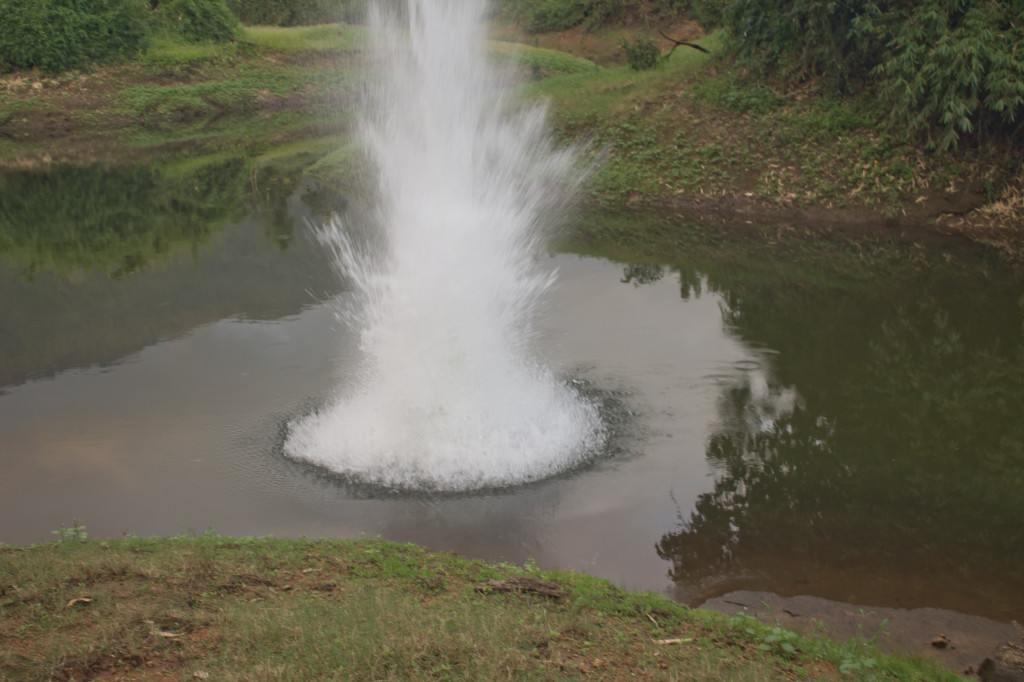Ten minutes into the dive, my customers and I were left startled and unsettled after a nearby blast resonated with a dull boom across the reef, sending shockwaves pulsing through our bodies. I felt the pressure of the bomb’s explosion in my chest, and it wasn’t until we surfaced and told the skipper that we realized what had happened. He told us that dynamite — or blast — fishing is an epidemic in Borneo and throughout Southeast Asia; its popularity is the result of lax enforcement of fishing laws, as well as cheap, accessible bomb-making materials. Fishermen typically fill a glass bottle with powdered explosive and pebbles, then throw it overboard. On impact with the reef, it explodes. The practice is a threat not only to the ocean, but also to the perpetrators. Although fishermen sometimes use commercial dynamite, they typically craft crude concoctions of potassium nitrate, kerosene or ammonium nitrate, which can explode prematurely, causing horrific injuries or death.

I have heard several more detonations since then, the most upsetting of which resulted in visible fallout from the explosion. Fish carcasses littered the area, although some were not yet dead and instead were left gasping pathetically for air on the seafloor. Dynamite fishing is not only detrimental to the marine environment, but is also wasteful. Most of the dead fish sink to the bottom of the ocean; fishermen collect only the small percentage that floats to the surface. On that occasion, the fishermen had already gathered most of the fish from the surface upon our ascent, leaving behind only the bloated body of an exquisite map pufferfish, whose poisonous flesh made it undesirable.
Dynamite fishing is also indiscriminate; the bomb cannot select only palatable or sustainable species. Fishermen kill all the fish in the vicinity, including those with suffering population numbers and those that play a key role in the health of the marine ecosystem. Removing certain species can have a domino effect on the delicate balance of the reef; for example, if a bomb kills too many parrotfish, the algae that they feed on will soon overtake and smother corals, even in adjacent areas not directly affected by the bomb. Habitat destruction and unsustainable fishing lead to depleted fish stocks and lower rates of reproduction, compromising the long-term livelihoods of the very fishermen using the dynamite.
As for the fish, they are not killed outright in the explosion; the shockwaves rupture their swim bladders and render them incapable of controlling their buoyancy and direction. They suffer a prolonged death as a result of drowning; they cannot move, and therefore can’t maintain the momentum needed to move water (and oxygen) over their gills. It’s not only the fish that suffer the horrifying effects of dynamite fishing, but the reefs below them. Researchers have agreed that this method of fishing poses one of the biggest human threats to reefs in the area, by destroying the physical structure of the corals and reducing them to a rubble wasteland from which there is no possibility of natural recovery. According to a study conducted in 2002, a homemade bomb in a 35-ounce beer bottle would destroy a section of reef 6.5 feet in diameter, resulting in the death of up to 80 percent of the corals within that area. Evidence of this abounds here in Kota Kinabalu; beautifully productive reefs often give way to desolate landscapes of dead and broken coral, and the fish life declines proportionately in these areas.
As with all conservation issues, the politics of dynamite fishing are complex. It’s not simply a case of uncaring or greedy fishermen; most of them are poverty stricken and desperate to net a big enough catch to keep their families fed, housed and schooled. They cannot afford to think of tomorrow when locked in a day-to-day struggle for survival. Additionally, the vast majority of these fishermen cannot swim — if they have never seen the reef, how can they be expected to care about conserving it? That reef conservation is inextricably connected to their future livelihoods is an unfamiliar concept to them without education.
For that reason, education is, and always will be, of paramount importance. Lack of any education is a real problem in local Bornean schools, let alone education about marine conservation. However, there is hope that awareness will spread as a result of dive shops primarily employing local divemasters, whose training is usually sponsored by the center. The notion that healthy reefs mean healthy incomes is the key to putting an end to dynamite fishing.

